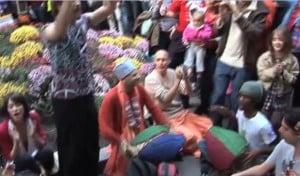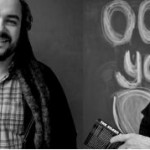What is the spirituality of the younger generation? Are they falling away from God as they leave the churches, or are they discovering – and creating – a new form of spirituality, one that goes back to the mystical roots of the Church? As we interviewed a wide range of young people in our research for Occupy Spirituality, we found them to be intensely spiritual as mystic activists, with seven common themes showing up among their beliefs and practices.
We’ll share these themes over the next posts, as important guideposts in defining the emerging spirituality of the 21st century: some are named by us and some are named for us as we engage with the new generation with deep respect, appreciation, and hope.
An Excerpt from Chapter 2 of Occupy Spirituality: A Radical Vision for a New Generation

by Adam Bucko and Matthew Fox, published by North Atlantic Books, copyright © 2013. Reprinted by permission of publisher.
ADAM BUCKO: The Occupy generation is being initiated into a new kind of spirituality, one that is ready to replace the God of Religion (or a God of any other morally bankrupt institution) with a God of Life. This spirituality is democratic, transformative, and dedicated to the healing of ourselves and our world. It is an active and all-encompassing spirituality that leaves nothing untouched, but rather it completely transfigures people and society.
This spirituality is already emerging. It is present in small circles of friends, Occupy-inspired groups, and certain spiritual communities. It is also emerging in the dialogues of young and old coming together in the spirit of reciprocity. It is present anywhere there is a direct meeting of hearts, which makes a meeting with God not only possible but inevitable.
We call it Occupy Spirituality. Its promise is no different from what Martin Luther King Jr. called the “beloved community.” We deeply believe that this spirituality has the potential to change both individual lives and the world as a whole.
….
Beyond the Boundaries of Tradition and Creed
The first characteristic of this new spirituality is that it is deeply ecumenical, interspiritual and post-traditional. In an article in Los Angeles Times, Philip Clayton, a dean of faculty at Claremont School of Theology, talked about the fastest-growing religious group in the United States, sometimes called “the nones,” “nonaffiliated,” or “spiritual but not religious.” As he pointed out, 75 percent of Americans between the ages of eighteen and twenty-nine now consider themselves “spiritual but not religious.”
Young people are not necessarily rejecting God, they just simply feel that “religious organizations are too concerned with money and power, too focused on rules and too involved It is for this reason that Philip Clayton feels that the rise of “spiritual but not religious” is not a sign of spiritual decline but rather “a new kind of spiritual awakening.”
Looking at this from a perspective of young people that I work with, I think that young people are very much interested in spirituality, but they find it outside of organized religion. They tend to adopt spiritual practices from various traditions, have interspiritual mentors, and thus create a post-religious and interspiritual framework for their spiritual lives. Even young people who are still connected to a specific tradition usually have a different relationship with that tradition than their parents did. They may feel rooted in the tradition but not stuck in it.
So while many of our religious leaders and media pundits still argue whether Muslims and Christians worship the same God, our young people have already moved beyond that. Not only do they believe that there is one underlying reality at the foundation of all major world religious, but they are also convinced that different traditions and their unique approaches to God complement each other.
In our next post, we’ll look at how the Occupy Generation navigates the dicey balance between doctrine and experience: if they’re not memorizing Sunday School lessons and catechism texts, what are they doing?
__________________________________________________________
Don’t miss the Occupy Spirituality Book Club on Patheos, September 16-30!
See when Matthew Fox and Adam Bucko will be speaking about Occupy Spirituality in your area: http;//www.matthewfox.org/calendar











